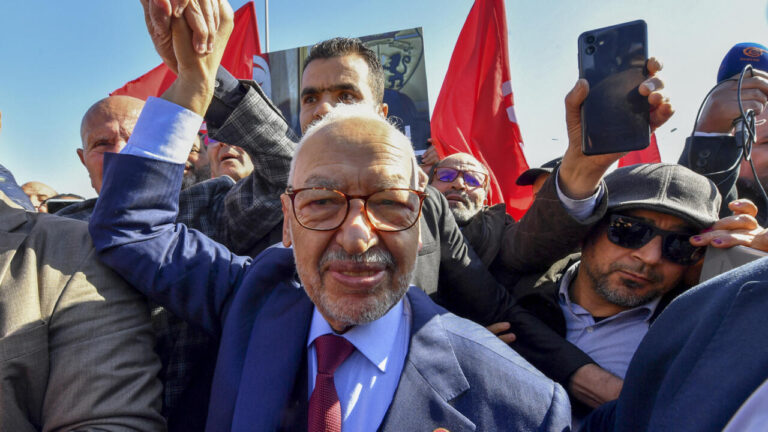Issued on:
A Tunisian court on Monday sentenced Rached Ghannouchi, one of the main opponents of Tunisian President Kais Saied, to a year in prison on terrorism-related charges, local media reported.
Ghannouchi, 81, a former speaker of parliament, was arrested last month over different accusations, part of what Human Rights Watch (HRW) called last week a move “to neutralise the country’s largest political party”.
He had appeared in court at the end of February on the terror-related charges after being accused of calling police officers “tyrants”.
The case is one of several levied by authorities against Ghannouchi, whose Islamist-inspired Ennahdha party was the largest in parliament before Saied dissolved the chamber in July 2021 as part of a power-grab allowing him to rule by decree.
He is among more than 20 of Saied’s political opponents and personalities, including former ministers and business figures, arrested since February.
His detention last month, along with the others, drew international concern, including from the European Union which recalled the importance of the “fundamental principle of political pluralism”.
The United States said the arrests “represent a troubling escalation by the Tunisian government against perceived opponents”.
German Foreign Minister Annalena Baerbock told reporters that Berlin viewed Ghannouchi’s arrest “with the greatest concern” and cautioned that the “democratic achievements in Tunisia since 2011 must not be lost”.
Economic problems
Saied, 65, claims those detained were “terrorists” involved in a “conspiracy against state security”.
Opponents have dubbed his actions a “coup” and a return to autocratic rule in the only democracy to emerge from the Arab Spring uprisings in the region more than a decade ago.
Ghannouchi was detained and remanded in custody in April after remarks warning that eradicating different viewpoints such as the left or political Islam, from which his party originated, might lead to a “civil war”.
The main opposition alliance, the National Salvation Front (FSN), of which Ennahdha is a member, said at the time that he had been held on suspicion of “plotting against state security”.
Ennahdha rejected any intention of Ghannouchi to call for a civil war, saying it “strongly condemns an unjust ruling which aims to cover up the total failure of the authorities to solve economic and social problems”.
In a report on Thursday, HRW said Tunisia’s “authorities have intensified their attack on opponents of President Kais Saied’s 2021 power grab”.
“After demonising the Ennahdha party and making serious accusations without proof, President Saied’s authorities have moved to effectively dismantle it,” said Salsabil Chellali, HRW’s Tunisia director.
“The Tunisian authorities should stop their reprisal against Ennahdha and other opponents and release all those jailed in the absence of credible evidence of crimes.”
Tunisia is heavily indebted and facing high inflation and unemployment, leading some of its citizens to try fleeing to Europe.
Tunisia has been negotiating for several months with the International Monetary Fund for a loan worth nearly $2 billion, but discussions appear to have stalled.
The exodus from the country has drawn concern from the EU.
Ghannouchi had already been in court last November over allegations his party had helped jihadists travel to Iraq and Syria.
Before that, he was interrogated over alleged money laundering in relation to foreign donations for an Ennahdha-linked charity.
A day after Ghannouchi’s arrest, authorities closed the offices of his party.
In addition to his prison term, Ghannouchi was fined 1,000 dinars ($326), local media reported.
(AFP)



